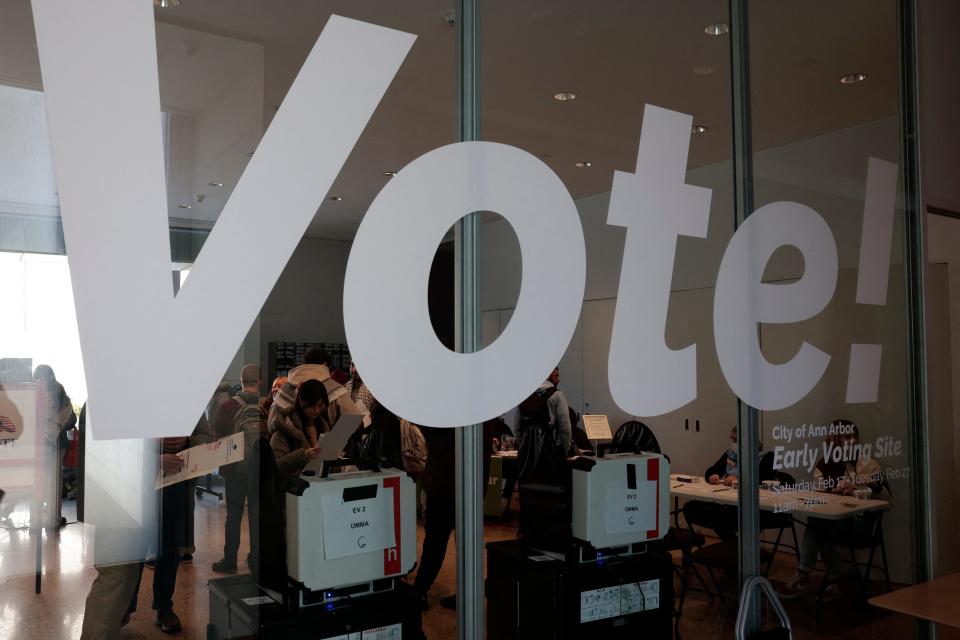Joe Biden faces toughest opponent yet — 'uncommitted' in Michigan primary: 5 takeaways
President Joe Biden has bulldozed his little-known primary foe in each of the Democratic contests, but his most formidable challenger to date was “uncommitted” in Michigan.
Biden easily KO’d Rep. Dean Phillips, D-Minn., to win the Wolverine State’s election on Tuesday, but roughly 13% of voters cast their ballot for the vacant option instead.
That’s because various Michigan progressive organizations and elected officials ? chiefly Rep. Rashida Tlaib, D-Mich.? are apoplectic at U.S. support for Israel.
Left-leaning voters, led by Arab-American activists, launched a campaign against Biden, which urged Democrats to wage a protest at the ballot box.

On the Republican side, former U.N. Ambassador Nikki Haley once again lost to front-runner Donald Trump. That makes six consecutive defeats to her old boss, who appears to be the inevitable GOP nominee.
But the Haley campaign is driving a point home by creating a different problem for the former president, showing how many conservative-minded voters don’t want him to be the 2024 nominee.
Here are five key takeaways from Tuesday’s election.
Biden v. ‘uncommitted’ a key test

The president was declared the early victory Tuesday night, but as the results trickled in, they showed a significant portion chose “uncommitted” over the president.
Early results had “uncommitted” hovering at around 13%, which was about three times more than the other candidates, including Phillips.
It also exceeded the roughly 11% ? or 20,833 votes ? who chose “uncommitted” over then-President Barack Obama in 2012.
With about 98% of the results reported by Wednesday morning, “uncommitted” stood at 100,960 votes against Biden. That is almost 10 times the 10,704 votes by which Trump defeated Hillary Clinton in 2016.
Organizers of this protest vote were quick to call out how the raw vote was a win for their anti-war movement and demonstrates their ability to sway the state.
Biden defeated Trump in Michigan four years ago by 154,188 votes.
Protest vote put focus on Gaza death toll

Organizers who waged the ballot box protest were looking to give the Biden campaign a wake-up call.
But they also wanted to put a spotlight on how serious the war in Gaza, which many progressive activists call a genocide, is to parts of the Democratic base.
The head of the World Health Organization has called Gaza a “death zone." More than 29,000 Palestinians in the Gaza Strip have been killed in the war, according to the territory’s health ministry, since Hamas militants launched a deadly surprise attack in Israel on Oct. 7.
Data for Progress, a progressive think tank, released a survey Tuesday that shows 77% of Democrats want the U.S. government to call for a permanent cease-fire.

A pause in the fighting between Israel and Hamas, which started this round of conflict with the Oct. 7 terrorist attack, could come as soon as the “end of the weekend,” Biden said Monday.
Such a move could allow the release of the roughly 100 hostages who remain alive in Hamas captivity, but that might be too late for those on the activist left who have vowed to join the “abandon Biden” movement in the fall.
Haley’s anti-Trump voters are stacking up

Haley’s losses are adding up as she searches for a state to win, but at the same time, she is receiving a significant chunk of support from anti-Trump Republicans.
In her home state of South Carolina, she raked in about 40% of the vote, and early margins showed her pulling roughly 31% in Michigan.
“Donald Trump is doing nothing to bring people into the party. Instead, he’s actively rejecting Republicans,” Haley said in a post on X, formerly Twitter.
“That’s a recipe for losing a general election.”
These numbers don’t do much for Haley in terms of winning the nomination, especially in winner-take-all states.
What it does is reveal a weakness for Trump that political observers say should worry his campaign.
A Fox News voter analysis found 6 in 10 Haley voters pledged they would not support Trump in the general election if he were the Republican nominee.
The former president’s supporters, however, will likely quickly pivot to say that once the race becomes a one-on-one contest with Biden on the other side, those voters will return to the GOP fold.
Michigan mutiny in divided state GOP

Just beneath the surface of the Haley-Trump primary is a messy Michigan Republican Party, which has been plagued by infighting for months.
For starters, the state GOP had two people ? Kristina Karamo and Pete Hoekstra ? claiming to be its chair. As voters flocked to the polls on Tuesday, a judge blocked Karamo ? who had control of the party bank account and emails ? from identifying herself as such.
Michigan Republicans also had to navigate a new and confusing hybrid system to award their 55 delegates, thanks to a law change by state Democrats.
Tonight’s results award 16 of the state party’s convention delegates to Trump, but the remaining 39 will have to be decided by a convention on Saturday.
The trouble is that the two rival factions are holding two conventions, and Karamo hasn’t said whether she would abandon her plans.
Super Tuesday to be Haley’s last stand?

While voters were flocking to the polls in Michigan, Haley was pitching to voters in Colorado, one of the more than a dozen states casting ballots on March 5, or Super Tuesday.
The Haley campaign had telegraphed that next week’s marathon of elections represents “significant fertile ground” for them, even though she has balked at saying which states.
Many political forecasts say it is her best, and last, stand against Trump.
“After Super Tuesday, we will have a very good picture of where this race stands,” Betsy Ankney, Haley’s campaign manager, said in a campaign memo released in January.
This article originally appeared on USA TODAY: Biden vs. 'uncommitted' in Michigan primary: 5 takeaways
